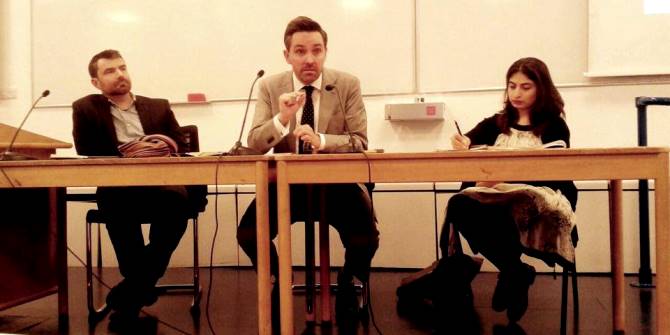 In the 2015-16 academic year the LSE SU Pakistan Development Society ran a ‘Breaking Stereotypes’ photo campaign which provided students and staff with a thought-provoking taster of the inclusive debate culture that the society seeks to encourage. In this post, Raza Nazar discusses the recurring themes that cropped up in the campaign, and how they will be incorporated in the Pakistan Development Society’s first conference in November.
In the 2015-16 academic year the LSE SU Pakistan Development Society ran a ‘Breaking Stereotypes’ photo campaign which provided students and staff with a thought-provoking taster of the inclusive debate culture that the society seeks to encourage. In this post, Raza Nazar discusses the recurring themes that cropped up in the campaign, and how they will be incorporated in the Pakistan Development Society’s first conference in November.
In the LSE SU Pakistan Development Society’s ‘How would you change Pakistan?’ campaign, participants were asked to write one sentence on how they would change Pakistan if they had the necessary power to do so. Students from a variety of backgrounds took part in the initiative and shared their thoughts. Among the various entries, four developmental themes surfaced: education, poverty and inequality, diversity and minority rights, and the need to foster ‘soft connections’.
Education
Education was a prominent theme that emerged – and not surprisingly. Basic access to education is a problem in Pakistan where literacy rates range from 96% in Islamabad to 28% in the Kohlu District. There is a pertinent issue in relation to woman’s education when comparing rural and urban areas. Deep-rooted conservatism appears to have played a role in restricting access to education for women in rural communities, where there tends to be a cyclical effect of family pressures to confine women to the household coupled with a wider cultural expectation to match this. It has been widely cited that the root of this conservatism is a culture of acquiescence, where girls are expected to act within particular boundaries or face isolation.
While there are problems, there is progress on this area as outlined in the Pakistan Government Vision 2025. The government plans to “shift the focus of education from memorisation to critical thinking and bring about comprehensive reforms in the national curriculum” to reflect this shift. A key leader of the project, the Minister for Planning and Development, Ahsan Iqbal will be part of the Conference in which educational reforms will be discussed under the umbrella of development at the LSE SU Future of Pakistan Conference this November.
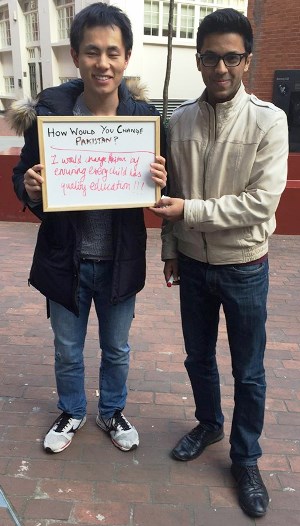

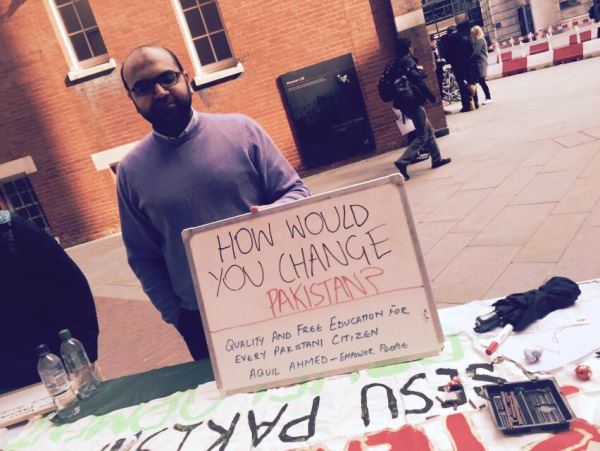
Poverty and inequality
Inextricably linked with education, poverty and inequality was another popular theme among the entries. The consensual view among participants was that this complex area needs to be prioritized by policymakers. When one considers the causes, there are undisputed gaps in our taxation system, which has led to consistent difficulties in financing public services such as education, healthcare and sanitation. These include a narrow tax base, widespread tax evasion and administrative weaknesses, providing an indication of why the growth of Pakistan’s administrative state has been sluggish.
Pakistan’s tax revenue is just 9 per cent of its gross domestic product, compared to a 15 per cent average across developing countries, and 40 per cent across developed countries. Adnan Qadir Khan, Research and Policy Director at the International Growth Centre at LSE since 2009, has carried out extensive research on the taxation system and reform. He will shed light on this area and offer his policy recommendations – a speaker to watch during the Economics session at the Future of Pakistan Conference.
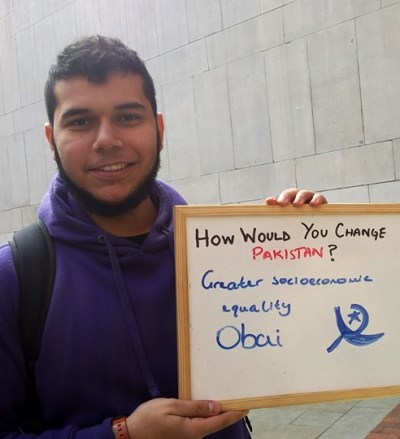
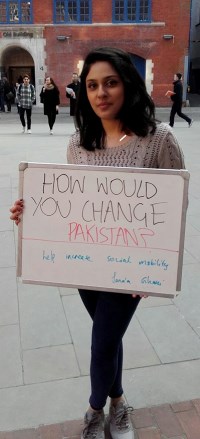
Diversity and minority rights
Living standards could surely be improved with an increased provision of public services, but would the improvements benefit all Pakistanis? In the Islamic Republic, there is significant controversy over the protection of minorities – many of which have faced increasing persecution in recent years. The country’s blasphemy laws have targeted members of religious minority communities and dissenting Muslims, which frequently results in imprisonment. It was unsurprising that ‘make Pakistan more secular’ was a recurring entries during the campaign. Can an inclusive democracy ever prosper if religion is brought to the centre of state affairs?
S Akbar Zaidi, one of Pakistan’s most widely acclaimed Political Economists, feels that the diversity of nations should be acknowledged, since nationalities could not be imposed on people. During the Politics session of the Future of Pakistan Conference, he will identify the key challenges to democracy in Pakistan and propose a strategy on how to overcome these.
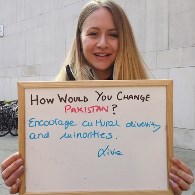
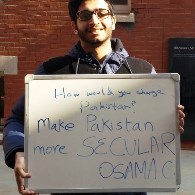

Develop ‘soft’ connections – culture, tourism, sport
Apart from tackling challenges in Pakistan’s political economy, participants encouraged the development of ‘soft’ connections such as tourism, culture, and sport. It was only this month when the Pakistan Cricket Team was ranked the best in the world by the International Cricket Council Rankings for Test matches. Aside from sport, many submitted responses in adoration of Pakistan’s dynamic cultural elements had attended the annual Student Union Qawwali Night at LSE earlier on in the year. Qawwali, a style of Sufi devotional music, has been a cultural hit and clearly made non-Pakistani students enthusiastic about sampling more. Such majestic exhibitions of culture do raise questions – what exactly is Pakistani culture and Pakistani identity?
Nabeel Goheer, Director of the Strategic Planning and Evaluation Division of The Commonwealth, will be advocating for accommodating ‘multiple identities’ at the Future of Pakistan Conference. He will do this by acknowledging the diversity of the nation-state and, crucially, supporting an inclusive approach to politics, economics and development in Pakistan.

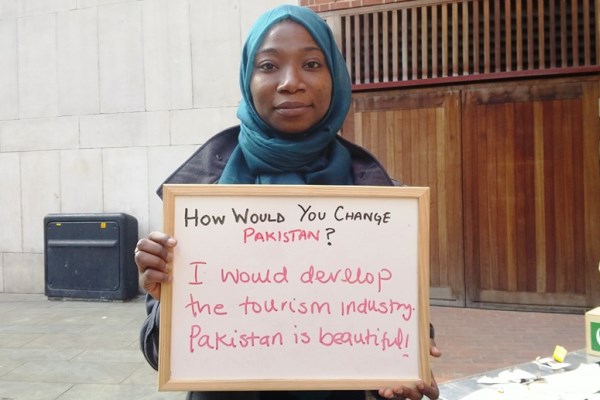
The LSE SU Future of Pakistan Conference will take place on 19th November 2016 at the Sheikh Zayed Theatre. It will provide a platform where a sitting minister, a professor, and a student can sit on the same table and engage with strategies and ideas for the future. This is a forum for future leaders who are curious to learn more about contemporary issues but also keen to offer insight and ideas on possible solutions. While one of the outcomes of the the first student-run Pakistan forum in London might be a report with policy recommendations for the Pakistani government, it is the inclusivity of the inaugural session that promises to leave the most lasting impression as it sets new trends for the future.
For more information and ticket details the inaugural LSE SU Future of Pakistan Conference on 19 November 2016 click here.
The LSE SU Pakistan Development Society works towards empowering the youth, breaking stereotypes through awareness campaigns, and moving the discussion about Pakistan forward. It is the first of its kind in London and will be launching the ‘Future of Pakistan Project’ this fall, with a notable conference on November at LSE. Follow their Facebook page for updates.
This post gives the views of the author, and not the position of the South Asia @ LSE blog, nor of the London School of Economics. Please read our comments policy before posting.
About the Author
 Raza Nazar is studying Law (LLB) with specialisation in human rights and administrative law at the London School of Economics and Political Science and is President of the LSE SU Pakistan Society. He is the first point of contact for any queries in relation to the Conference.
Raza Nazar is studying Law (LLB) with specialisation in human rights and administrative law at the London School of Economics and Political Science and is President of the LSE SU Pakistan Society. He is the first point of contact for any queries in relation to the Conference.




